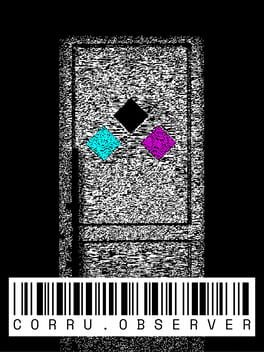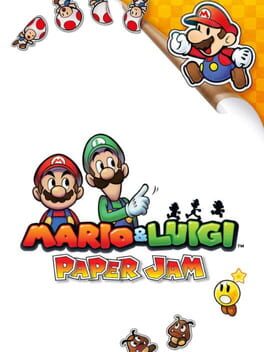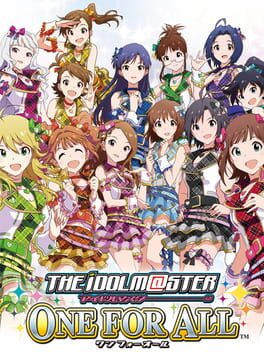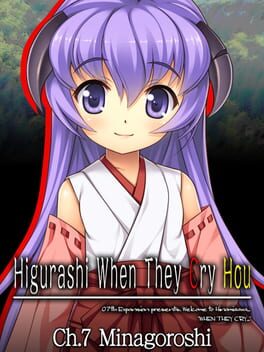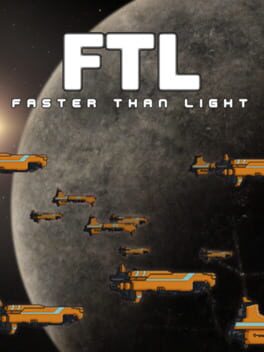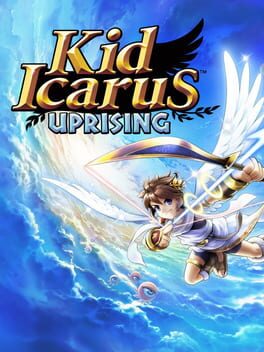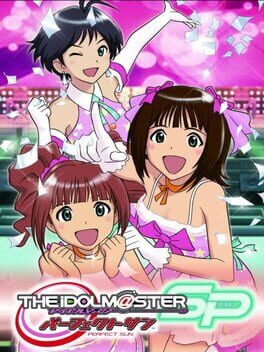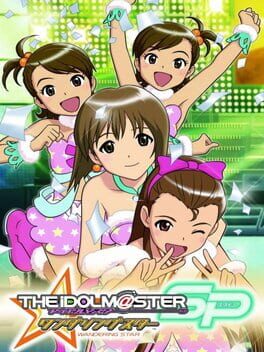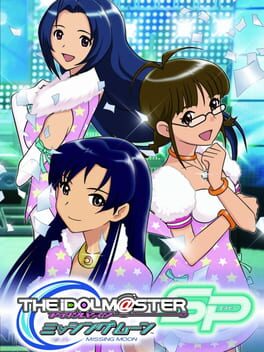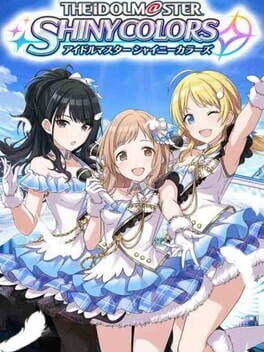dr_awesome
45 reviews liked by dr_awesome
Corru.Observer
2022
It feels like it should be a lot bigger of a deal that this game has been fully fan translated, it's surreal to play a whole PS3 game this way almost feeling like it's an official localization.
The gameplay can basically be summarized as more of a rhythm battle RPG than the previous games, you level up your idols to raise their stats and can spend points in a skill tree. I would talk about the gameplay mechanics and what kind of strategies develop out of it but I feel like this page explains it well enough. Each in-game week you pick a job, and 90% of the jobs you're going to be doing are the rhythm minigame. There's slightly different forms of it, with auditions, lives, festivals, and rank up festivals. Auditions are free so they earn you money, lives cost money but they earn you more fans, festivals are free but you directly play against an AI opponent. The AI can be challenging because they can do all the same moves you can do and use unique skills that can really mess you up. It's very repetitive but also somehow addicting, and it helps you can switch the songs you use as often as you want, along with a massive amount of songs available if you install all the DLC (if you know where to search).
The other type of job available to you is promotions: there's only ever 2 available for each idol, a free one and a paid one. Ranking up replaces them with new promotions fitting for the idol's popularity level, but they're all short and not that interesting as commus since there's never any dialogue choices to make during them, so you don't really need to do them outside of grinding for memory points (more on this later) or skipping through weeks when you don't want to do the rhythm minigame. However make sure to do each paid promotion for every idol once they reach A rank because those reward you with accessories.
You start off picking one idol and the game pretty quickly gives you 2 more, after that you unlock a new idol after every in-game season (12 weeks) until after the 8th idol, the last 5 are unlocked every 2 seasons (apparently there's only 48 weeks in a year here). I only unlocked the last idol after 38 hours of playtime (I chose Iori last, also FYI it took me 33 hours to beat Final Fantasy VII). It's actually very easy to keep most of them within range of your highest level/ranked idol, they all earn EXP and fans even when you're not using them. I found I could just focus on doing jobs for my favorites (Chihaya, Takane, Azusa) until the other idols reached enough fans to let me skip rank up festivals for them, and use my strongest idols to carry the weaker ones through those. There's actually no downside to skipping rank up festivals, you can skip up to 3 at a time (for example, you can skip from C3 or C2 to B3 but can't skip to B2 or B1 without being B3 first) and you'll earn all the skill points in bulk.
Commus are different from the previous games, each week you can check if new commus are available, and doing them doesn't use up the week, so they're completely optional and you could skip straight to jobs if you want (don't do this though). They've also been simplified, you either only ever make one choice that determines if you get perfect/normal/bad, or the commu doesn't have any choice at all and you automatically get a perfect commu. You're not penalized for getting bad commus as in you won't lose memory points, but the way the UI flashes the heart at the end of commus regardless of perfect/normal/bad still makes me unable to tell if you gain points or not from the bad commus (I'm actually almost sure now that they do raise it). Some bad commus can be funny so you can just relax and choose whatever you want (but if you want to refer to a guide for perfect commus then https://idolmasterofa.fandom.com has most of them) and you can always get a chance to replay them randomly but you won't get memory points after the first time. To explain memory points, it's a heart that fills up extremely slowly, each time it becomes full it permanently increases the number of memory appeals you can use during lives, the max an idol can reach is 5. Every type of job gives you memory points and the game can also randomly give you commus before and after jobs, giving you a lot of chances to earn memory points. A lot of commus have 2 or 3 idols interacting with each other as well and will give you memory points for all of them.
Lessons don't use up the week now either, you can do one before you choose a job. There's 3 types of lessons available and they give a temporary boost to one of the 3 stats for all your idols for a couple weeks. I appreciate this a lot because I actually still hate these minigames and I never used the lessons besides one time so far in this playthrough, so it's nice that they're completely optional. Later on the in-game shops start selling magazines that give you the affects of the highest level lesson instantly which is extremely convenient, especially for the DLC jobs.
This game has a significant time investment if you actually want to complete even one of the idol's routes, I can't recommend it unless you already love most of the characters. I beat the Idol Extreme with my first idol, Chihaya, after 40 hours, and beat it with the rest of the idols after 55 hours. Getting story progression for each idol as she becomes more famous and unlocking new commus kept me going this long. Even after that there's all the DLC stories as well.
There's no fail state or week limit in the game, the most you can be penalized for is not achieving a season goal that Takagi gives you (such as earning X amount of money or passing X auditions), in which case you temporarily lose an idol, but you'd have to be explicitly trying to fail those since they're so easy. It's not a big deal to lose at a performance (though you can just restart the game before it autosaves). So overall you can play it pretty laidback and don't have to stress about doing anything too quickly (but you'll have to take festivals seriously as they can get challenging). I also only found out after 40+ hours of gameplay that if you ignore too many reporters, an evil reporter will appear and reduce your job rewards for a few weeks.
If you install all the DLC be mindful about installing the money DLC as well if it's your preference to play without being given a ton of free money on your savefile, because every time you load your savefile it'll nag you about 24 times if you want to use the money (it totals to 7,200,000 yen). I just went ahead and used them all however so I haven't actually had to worry about money management at all throughout this playthrough, I just want to buy all the outfits and accessories whenever they first become available.
Full disclosure I chose to unlock the idols in this order: Chihaya -> Takane -> Azusa -> Miki -> Yukiho -> Haruka (at this point I was feeling bad about keeping her and Chihaya apart this long) -> Ritsuko -> Yayoi -> Makoto -> Hibiki -> Ami -> Mami -> Iori.
That doesn't fully indicate my favorites though because I probably should've chose Yayoi and Makoto before Yukiho and it's more Yukiho's 1st Vision seiyuu I like instead of her current 2nd Vision seiyuu in this game.
Lastly there's a quirk about emulating the game in RPCS3, resolution scaling past 720p won't work because of whatever post-processing the game does and it'll just make everything more jagged instead, so if you wanted to see your idols in 4K it's not happening. Theoretically someone could make a patch since this is a common problem for PS3 games that used post-process anti-aliasing like MLAA, many patches for other games exist.
The gameplay can basically be summarized as more of a rhythm battle RPG than the previous games, you level up your idols to raise their stats and can spend points in a skill tree. I would talk about the gameplay mechanics and what kind of strategies develop out of it but I feel like this page explains it well enough. Each in-game week you pick a job, and 90% of the jobs you're going to be doing are the rhythm minigame. There's slightly different forms of it, with auditions, lives, festivals, and rank up festivals. Auditions are free so they earn you money, lives cost money but they earn you more fans, festivals are free but you directly play against an AI opponent. The AI can be challenging because they can do all the same moves you can do and use unique skills that can really mess you up. It's very repetitive but also somehow addicting, and it helps you can switch the songs you use as often as you want, along with a massive amount of songs available if you install all the DLC (if you know where to search).
The other type of job available to you is promotions: there's only ever 2 available for each idol, a free one and a paid one. Ranking up replaces them with new promotions fitting for the idol's popularity level, but they're all short and not that interesting as commus since there's never any dialogue choices to make during them, so you don't really need to do them outside of grinding for memory points (more on this later) or skipping through weeks when you don't want to do the rhythm minigame. However make sure to do each paid promotion for every idol once they reach A rank because those reward you with accessories.
You start off picking one idol and the game pretty quickly gives you 2 more, after that you unlock a new idol after every in-game season (12 weeks) until after the 8th idol, the last 5 are unlocked every 2 seasons (apparently there's only 48 weeks in a year here). I only unlocked the last idol after 38 hours of playtime (I chose Iori last, also FYI it took me 33 hours to beat Final Fantasy VII). It's actually very easy to keep most of them within range of your highest level/ranked idol, they all earn EXP and fans even when you're not using them. I found I could just focus on doing jobs for my favorites (Chihaya, Takane, Azusa) until the other idols reached enough fans to let me skip rank up festivals for them, and use my strongest idols to carry the weaker ones through those. There's actually no downside to skipping rank up festivals, you can skip up to 3 at a time (for example, you can skip from C3 or C2 to B3 but can't skip to B2 or B1 without being B3 first) and you'll earn all the skill points in bulk.
Commus are different from the previous games, each week you can check if new commus are available, and doing them doesn't use up the week, so they're completely optional and you could skip straight to jobs if you want (don't do this though). They've also been simplified, you either only ever make one choice that determines if you get perfect/normal/bad, or the commu doesn't have any choice at all and you automatically get a perfect commu. You're not penalized for getting bad commus as in you won't lose memory points, but the way the UI flashes the heart at the end of commus regardless of perfect/normal/bad still makes me unable to tell if you gain points or not from the bad commus (I'm actually almost sure now that they do raise it). Some bad commus can be funny so you can just relax and choose whatever you want (but if you want to refer to a guide for perfect commus then https://idolmasterofa.fandom.com has most of them) and you can always get a chance to replay them randomly but you won't get memory points after the first time. To explain memory points, it's a heart that fills up extremely slowly, each time it becomes full it permanently increases the number of memory appeals you can use during lives, the max an idol can reach is 5. Every type of job gives you memory points and the game can also randomly give you commus before and after jobs, giving you a lot of chances to earn memory points. A lot of commus have 2 or 3 idols interacting with each other as well and will give you memory points for all of them.
Lessons don't use up the week now either, you can do one before you choose a job. There's 3 types of lessons available and they give a temporary boost to one of the 3 stats for all your idols for a couple weeks. I appreciate this a lot because I actually still hate these minigames and I never used the lessons besides one time so far in this playthrough, so it's nice that they're completely optional. Later on the in-game shops start selling magazines that give you the affects of the highest level lesson instantly which is extremely convenient, especially for the DLC jobs.
This game has a significant time investment if you actually want to complete even one of the idol's routes, I can't recommend it unless you already love most of the characters. I beat the Idol Extreme with my first idol, Chihaya, after 40 hours, and beat it with the rest of the idols after 55 hours. Getting story progression for each idol as she becomes more famous and unlocking new commus kept me going this long. Even after that there's all the DLC stories as well.
There's no fail state or week limit in the game, the most you can be penalized for is not achieving a season goal that Takagi gives you (such as earning X amount of money or passing X auditions), in which case you temporarily lose an idol, but you'd have to be explicitly trying to fail those since they're so easy. It's not a big deal to lose at a performance (though you can just restart the game before it autosaves). So overall you can play it pretty laidback and don't have to stress about doing anything too quickly (but you'll have to take festivals seriously as they can get challenging). I also only found out after 40+ hours of gameplay that if you ignore too many reporters, an evil reporter will appear and reduce your job rewards for a few weeks.
If you install all the DLC be mindful about installing the money DLC as well if it's your preference to play without being given a ton of free money on your savefile, because every time you load your savefile it'll nag you about 24 times if you want to use the money (it totals to 7,200,000 yen). I just went ahead and used them all however so I haven't actually had to worry about money management at all throughout this playthrough, I just want to buy all the outfits and accessories whenever they first become available.
Full disclosure I chose to unlock the idols in this order: Chihaya -> Takane -> Azusa -> Miki -> Yukiho -> Haruka (at this point I was feeling bad about keeping her and Chihaya apart this long) -> Ritsuko -> Yayoi -> Makoto -> Hibiki -> Ami -> Mami -> Iori.
That doesn't fully indicate my favorites though because I probably should've chose Yayoi and Makoto before Yukiho and it's more Yukiho's 1st Vision seiyuu I like instead of her current 2nd Vision seiyuu in this game.
Lastly there's a quirk about emulating the game in RPCS3, resolution scaling past 720p won't work because of whatever post-processing the game does and it'll just make everything more jagged instead, so if you wanted to see your idols in 4K it's not happening. Theoretically someone could make a patch since this is a common problem for PS3 games that used post-process anti-aliasing like MLAA, many patches for other games exist.
When I first watched the anime for Higurashi, I always felt the most mixed about this arc. While the ride is fun for its duration, it ends up feeling incredibly pointless when victory is snatched away at the very end. I have a different opinion now, and I think it actually contributes a lot to the message of the entire series. Nonetheless this arc is still significantly more flawed than the previous ones, especially compared to the prior two answer arcs which were nearly perfect.
One of the surface level issues with this arc is that it's unfortunately the 7th game out of 8. With the themes of this chapter being all about fighting against fate and not falling to pessimism, it's somewhat harmed when you know going in that it's doomed to failure. It's worth noting that I now feel this perspective is somewhat invalid, as the journey there is incredibly important and Rika's eventual failure is critical to showing how this chapter developed her and her perspective. Nonetheless, my first thoughts when I finished the anime version of this arc were "that was pointless," so I felt the need to note this down.
The more pressing issue with this arc is regarding it's main antagonist, the Child Welfare Office. This government agency is depicted as so comically incompetent that it's hard to take the arc seriously. The employees don't know anything about the case, and the social workers and administrators are made out to be incredibly stubborn for the sole purpose of establishing an antagonist to work against. The interactions with the office are incredibly slow and boring too, since it basically bogs you down in a slew of government bureaucracy alongside the main cast. Ryukishi even admits that his depiction of the office was poor in the Staff Room, and apologies for it. Government corruption and incompetence is an interesting topic to tackle, but this arc handles it poorly and is extremely one-note.
As for the positives, the entire first section of this arc is a 10/10. Being able to see Rika's perspective is awesome as a twist from the previous chapters, and Hanyuu just being dumped on you without much initial explanation is really funny. There's a ton of cute interactions early on, and it's lovely to see how Keiichi is able to break down Rika's negative mindset and encourage her to work towards changing her own fate for the rest of this chapter. The character interactions are genuinely at their all time peak for the series in the first half. When Teppei eventually shows up, it elicits genuine emotion and it's heartbreaking to see how Rika desperately struggles to save Satoko before eventually giving up. She even goes as far to request that the Yamainu and Takano assassinate her uncle (which is a different issue I'll discuss later).
Even after Teppei shows up, this arc stays positive. The scene with Keiichi and Shion's argument over how to deal with Teppei is amazing, and I love how Shion is made to directly parallel Ch.3 Keiichi, even repeating the 1500 seconds line again. It's another great aspect of his character development and a fantastic continuation of his role from the previous arc.
Overall though I think the flaws of this arc become the most noticeable once it shifts back to a Keiichi POV. Staying with Rika's POV could've allowed the Child Welfare Office segment to have a more unique perspective as well as give the new character of Hanyuu more time to shine. Although Keiichi is not a bad character by any means (quite the opposite really), it still takes away one little change that could've kept the arc more unique. As per usual though it's still fun to see him band together a crowd to fight for Satoko. The section where he convinces Mion's Grandmother is where the arc finally starts getting good again.
After Satoko is saved, the arc switches back to a primarily Rika POV, which is a breath of fresh air. Probably the main benefit of the sluggish government bureaucracy segment is that it almost makes you forget that Rika is still going to get killed soon. This makes the sudden snap back to reality after their success feel a lot more impactful, which I thought was really well executed. Everything from Rika's preparations up to the Takono reveal and her execution are really enthralling to read. I really love the Hinamizawa Syndrome lore dump too, though its questionable how Rika knows so much about it and yet never suspected Takano seriously. The scene where Takano walks up to each restrained club member and shoots them in the head is honestly kinda peak. Rika's execution scene is also beautifully done, and I love it for the same reasons I love Satoko's resolve in Ch.5. The Emergency Manual 34 segment at the end is also harrowing, though I think it was probably one of the most underwhelming endings compared to Ch.3, 5, or 6. I guess it's because the main cast is already dead at that point, so you're only hearing about unnamed villagers being killed.
Another issue that people take with this arc/Rika as a character is how she never once suspected Takano/the Yamainu as being her killers. This is honestly completely understandable, and has always been Higurashi's greatest structural flaw. This is especially the case with Hanyuu introduced, the sole supernatural element in the series who explicitly goes out and about with her sole ability being to observe people. However, in her defense, the Yamainu and Tokyo represent Rika's critical blind spot that she has no reason to ever suspect of killing her. As explained in the chapter, they're actually the people she suspects the least of killing her, since they know best that her death could cause a potential disaster. It's also stated that she has suspected Takano individually of being a potential culprit, although that topic isn't explored much more than as an offhanded remark.
Hanyuu is another good addition to this arc as well, and having Oyashiro-sama be a useless crybaby is a very funny twist (I love her). Her role as an unwitting antagonist is incredibly interesting, and partially explains why Rika was unable to solve her murder after 100 years. Her pessimism has been the primary reason for Rika being so reactive as opposed to active in the previous chapters, and the fact that Rika is the sole person she can talk to/be seen by can partially explain why Hanyuu never particularly helped to save her, instead keeping her stuck in the loops forever. I love how, by the ending, the goal shifts from breaking Rika's pessimistic attitude to instead breaking Hanyuu's, with Rika's perspective now fully changed. The implication that Hanyuu's existence is the cause of Hinamizawa syndrome is another interesting aspect of her character that is often left undiscussed. Overall I think she's really well executed here, but I'm more interested to see how she's handled in the following chapter.
The biggest issue with this chapter is definitely that it's the first one that requires a significant level of suspension of disbelief. Hanyuu (and, by proxy, Rika's looping) is the first outright supernatural occurrence in the story that cannot be explained by anything else. Additionally, the laughable incompetence and stubbornness by the Child Welfare Office is really hard to believe, making it harder to really get immersed in the story. An issue that arises at the end of the chapter regards the Yamainu, Takano, and the club itself. The Yamainu are meant to be an elite assassination unit, and yet they get their asses whooped by the unarmed club members and are only bailed out through their numbers and by Takano. This is an issue that only gets worse in Chapter 8, and it's really hard to take seriously and not just laugh at. It's arguable that it can just be seen as an extension of the club games though, but its still silly when they're beating actual soldiers in a hand to hand combat scenario and somehow not just getting immediately gunned down like Oishi was. The Emergency Manual 34 and Takano's motivations are also somewhat hard to believe, but I think that's a topic better discussed in Ch.8.
Overall though I still think this is a fairly solid chapter, but it's definitely shakier than 5 or 6. The beginning is fantastic, but the middle is a difficult-to-believe slog. The ending is once again really gripping to read though, and overall is the perfect setup for Chapter 8.
One of the surface level issues with this arc is that it's unfortunately the 7th game out of 8. With the themes of this chapter being all about fighting against fate and not falling to pessimism, it's somewhat harmed when you know going in that it's doomed to failure. It's worth noting that I now feel this perspective is somewhat invalid, as the journey there is incredibly important and Rika's eventual failure is critical to showing how this chapter developed her and her perspective. Nonetheless, my first thoughts when I finished the anime version of this arc were "that was pointless," so I felt the need to note this down.
The more pressing issue with this arc is regarding it's main antagonist, the Child Welfare Office. This government agency is depicted as so comically incompetent that it's hard to take the arc seriously. The employees don't know anything about the case, and the social workers and administrators are made out to be incredibly stubborn for the sole purpose of establishing an antagonist to work against. The interactions with the office are incredibly slow and boring too, since it basically bogs you down in a slew of government bureaucracy alongside the main cast. Ryukishi even admits that his depiction of the office was poor in the Staff Room, and apologies for it. Government corruption and incompetence is an interesting topic to tackle, but this arc handles it poorly and is extremely one-note.
As for the positives, the entire first section of this arc is a 10/10. Being able to see Rika's perspective is awesome as a twist from the previous chapters, and Hanyuu just being dumped on you without much initial explanation is really funny. There's a ton of cute interactions early on, and it's lovely to see how Keiichi is able to break down Rika's negative mindset and encourage her to work towards changing her own fate for the rest of this chapter. The character interactions are genuinely at their all time peak for the series in the first half. When Teppei eventually shows up, it elicits genuine emotion and it's heartbreaking to see how Rika desperately struggles to save Satoko before eventually giving up. She even goes as far to request that the Yamainu and Takano assassinate her uncle (which is a different issue I'll discuss later).
Even after Teppei shows up, this arc stays positive. The scene with Keiichi and Shion's argument over how to deal with Teppei is amazing, and I love how Shion is made to directly parallel Ch.3 Keiichi, even repeating the 1500 seconds line again. It's another great aspect of his character development and a fantastic continuation of his role from the previous arc.
Overall though I think the flaws of this arc become the most noticeable once it shifts back to a Keiichi POV. Staying with Rika's POV could've allowed the Child Welfare Office segment to have a more unique perspective as well as give the new character of Hanyuu more time to shine. Although Keiichi is not a bad character by any means (quite the opposite really), it still takes away one little change that could've kept the arc more unique. As per usual though it's still fun to see him band together a crowd to fight for Satoko. The section where he convinces Mion's Grandmother is where the arc finally starts getting good again.
After Satoko is saved, the arc switches back to a primarily Rika POV, which is a breath of fresh air. Probably the main benefit of the sluggish government bureaucracy segment is that it almost makes you forget that Rika is still going to get killed soon. This makes the sudden snap back to reality after their success feel a lot more impactful, which I thought was really well executed. Everything from Rika's preparations up to the Takono reveal and her execution are really enthralling to read. I really love the Hinamizawa Syndrome lore dump too, though its questionable how Rika knows so much about it and yet never suspected Takano seriously. The scene where Takano walks up to each restrained club member and shoots them in the head is honestly kinda peak. Rika's execution scene is also beautifully done, and I love it for the same reasons I love Satoko's resolve in Ch.5. The Emergency Manual 34 segment at the end is also harrowing, though I think it was probably one of the most underwhelming endings compared to Ch.3, 5, or 6. I guess it's because the main cast is already dead at that point, so you're only hearing about unnamed villagers being killed.
Another issue that people take with this arc/Rika as a character is how she never once suspected Takano/the Yamainu as being her killers. This is honestly completely understandable, and has always been Higurashi's greatest structural flaw. This is especially the case with Hanyuu introduced, the sole supernatural element in the series who explicitly goes out and about with her sole ability being to observe people. However, in her defense, the Yamainu and Tokyo represent Rika's critical blind spot that she has no reason to ever suspect of killing her. As explained in the chapter, they're actually the people she suspects the least of killing her, since they know best that her death could cause a potential disaster. It's also stated that she has suspected Takano individually of being a potential culprit, although that topic isn't explored much more than as an offhanded remark.
Hanyuu is another good addition to this arc as well, and having Oyashiro-sama be a useless crybaby is a very funny twist (I love her). Her role as an unwitting antagonist is incredibly interesting, and partially explains why Rika was unable to solve her murder after 100 years. Her pessimism has been the primary reason for Rika being so reactive as opposed to active in the previous chapters, and the fact that Rika is the sole person she can talk to/be seen by can partially explain why Hanyuu never particularly helped to save her, instead keeping her stuck in the loops forever. I love how, by the ending, the goal shifts from breaking Rika's pessimistic attitude to instead breaking Hanyuu's, with Rika's perspective now fully changed. The implication that Hanyuu's existence is the cause of Hinamizawa syndrome is another interesting aspect of her character that is often left undiscussed. Overall I think she's really well executed here, but I'm more interested to see how she's handled in the following chapter.
The biggest issue with this chapter is definitely that it's the first one that requires a significant level of suspension of disbelief. Hanyuu (and, by proxy, Rika's looping) is the first outright supernatural occurrence in the story that cannot be explained by anything else. Additionally, the laughable incompetence and stubbornness by the Child Welfare Office is really hard to believe, making it harder to really get immersed in the story. An issue that arises at the end of the chapter regards the Yamainu, Takano, and the club itself. The Yamainu are meant to be an elite assassination unit, and yet they get their asses whooped by the unarmed club members and are only bailed out through their numbers and by Takano. This is an issue that only gets worse in Chapter 8, and it's really hard to take seriously and not just laugh at. It's arguable that it can just be seen as an extension of the club games though, but its still silly when they're beating actual soldiers in a hand to hand combat scenario and somehow not just getting immediately gunned down like Oishi was. The Emergency Manual 34 and Takano's motivations are also somewhat hard to believe, but I think that's a topic better discussed in Ch.8.
Overall though I still think this is a fairly solid chapter, but it's definitely shakier than 5 or 6. The beginning is fantastic, but the middle is a difficult-to-believe slog. The ending is once again really gripping to read though, and overall is the perfect setup for Chapter 8.
Kid Icarus: Uprising
2012
1 list liked by dr_awesome

